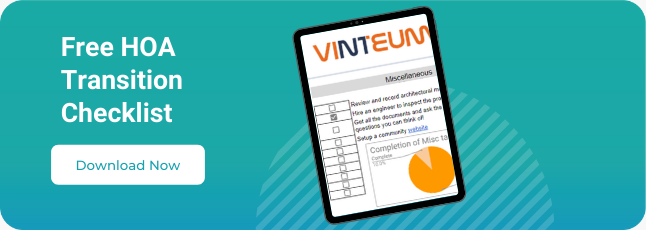There comes a time in the life of a homeowners association when the HOA transitions from the developer’s hands to the owners’. When proper steps are taken by both developers and owners the transition from developer to the board goes smoothly. Cooperation and communication need to happen with respect and integrity, to ensure success. In this article, we’re going to go through the 8 key steps for an HOA to transition smoothly from being developer-controlled to being an owners’ association.
When does the HOA’s transition from developer to owners happen?
The HOA’s transition doesn’t happen as one quick break, it happens over time.
It depends on the state that you live in when control is turned over from the developer to the owners. The trigger is normally a certain time period after a certain percentage of units have been sold.
For example, in Florida, Chapter 720, Section 720.307 states that 3 months after 90% of parcels in all phases have been sold, the community will start to be operated by the members.
Having said that, the transition doesn’t start on the date set for developers to step back. It needs to begin at least a year before that. A committee made up of residents needs to work closely with the developer and other professionals to make sure that they know what is going on to run the HOA well.
In this article, we’re going to look at 8 key steps to ensure that this transition happens smoothly.
Timeframes and benchmarks for when an HOA can or will be turned over to owners are often set out in the HOA’s bylaws, as well as state laws. A committee should be created at least a year before the HOA’s transition happens. That way, the right people are in place throughout the transition.
Residents need to organize to become a committee and keep the developer in the loop about this. Sometimes the developer will also appoint people as part of the board, to help with the transition of power until homeowners can have an election for board members. It should also have at least one industry professional with experience in associations and development.
2. Hire professionals to help with the HOA’s transition
Many HOA management companies will be able to assemble the necessary expertise for the transition.
Manager
Make sure the transition team is in agreement, as a certified community manager is an important professional who can support you throughout the process of becoming an independent association. A community association manager with expertise in transition HOAs is a great asset to the committee to smooth dealings with the developer and to help with any hurdles that you may face.
Engineer
The board should also hire a professional, licensed civil engineer to analyze and inspect all of the common elements of the project. This includes readily apparent construction defects, and also hidden defects like foundation cracks, faulty electrical wiring, premature road failure, and more.

Accountant
An accountant can help you to audit the developer’s financial documents. Often developer-related expenses are paid for by the association, so the board should be aware of what’s going on. The accountant will also check if there has been any mismanagement of funds.
Attorney
An attorney can help the board with any legal questions. They can also check contracts, CC&Rs, warranties, and documents. It’s good to have the contact of a reliable attorney to help you with any legal questions.
3. Audit all documents and contracts
When developing a project, the developer may execute contracts on behalf of the homeowners association. These contracts, as well as owner information and correspondence, maintenance records, insurance certificates, and claims history, belong to the association. The resident committee needs to audit all documents and contracts, have copies of them, and understand them.
Those copies should be safely stored, preferably in a secure system online so that they can’t be lost, as Neigbrs by Vinteum, which allows you to storage and share with residents important documents and data.

The board of directors needs to be sure that the contracts are reasonable. If they’re not, then you should be able to withdraw from them if you provide notice, especially after the transition is complete. An attorney can be a great assistance when checking contracts, especially if the HOA wants to get out of them.
4. Tour the project with an engineer
The transition team engineer should carefully inspect the community with a licensed professional and create a punch list for the final transition. This is called a transition study, the engineer will inspect the new community’s common areas. After that, they provide you with a list of alleged and discovered construction defects. That way, they are the developer’s responsibility, and the association won’t have to pay for issues in the future.
It will also provide the board with information on warranties, permits, and utility line locations which helps them run the community. The sooner you do a transition study, the better to make sure that the developer has to respond to any issues and can’t claim that the issue began after they handed over the association, and isn’t their responsibility.
5. Set up regular meetings for clear communication
A good rule to follow is to designate one person as the liaison between the transition team, and the developer. Then, copy at least one other individual on both sides in all correspondence. It’s a good idea to set up a board email so that more than one person has access to this correspondence.
The new board or transition committee should meet once a week to deal with all issues, and keep communication open and transparent. Many developers have the most basic rules to help sell properties and don’t include rules on pets or parking.
You should also speak to the developer to get important documents:
-
- Recorded Declarations,
-
- Articles of Incorporation,
-
- Owners’ contact information,
-
- Meeting minutes,
-
- Financial statements,
-
- Tax returns
-
- Insurance policies,
-
- Contractors’ contracts,
-
- Warranties
You need to ensure that they have those documents and that the board receives copies of them. You should then store copies securely online.
6. Execute and record maintenance items
It’s important to record what was fixed to help guide the transition. There should also be an exact date established for the owner-controlled Board to assume maintenance duties.
Starting to deal with maintenance issues helps the board to be prepared for life post-transition. It also helps to know your rights and responsibilities during the transition process, which a community manager and lawyer can help you with.
Try to start communicating with residents who have moved into the association to make sure they know who to contact if they have questions. You can do this by setting up a welcome wagon, or by a board member popping around to introduce themselves. This helps when they have to turn to the board with questions or concerns.

You could also start a newsletter, which helps to put a friendly face to their governing body and keeps residents in the loop. It’s a great project for residents to get involved in, and it’s a useful way to share community news.
7. Get finances under the board’s control
The board should check the developer’s accounting records so that they know what has been paid and ensure that everything is documented. This will give you a realistic picture of your HOA’s financial situation.
A Certified Public Accountant (or CPA) will be able to ask the right questions, audit financial documents, and make sure all monies have been handled properly. A CPA can be invaluable for new boards to ensure that the developer has handled funds correctly and the board knows what to do with the money in the future.
To help the board stay in control of income and expenses, we created a calculator specially designed for HOAs. You can include HOA dues, and all the expenses, as well as any reserves that you may require.

8. Wrap up loose ends
Throughout the transition process, details will surface, such as:
Registered Agent
You should read your association’s CC&Rs and your state’s rules to make sure you’re taking the right steps. An important detail that can’t be forgotten is appointing a new registered agent so that if your association gets sued you’ll know. A registered agent receives the service of process if legal action is taken.
Have clear responsibilities in the team
Transition teams need to be detail-oriented. You need to ask questions, expect perfection, and know when things are supposed to happen and who is responsible for each action at all times.
To help you be in charge and organized using a checklist can help everyone work together. It helps to know who is doing what and when important deadlines are. Our personalizable transition checklist allows the whole team to work more efficiently.

Hire software
The other project for a new board to think about is hiring software. You can post those important documents to a secure portal, and communicate with residents. Most companies also provide a public website, so you can announce your existence to the world. Having software can help boards to manage their community without getting bogged down with manual processes.
Wrapping up: HOA transition from developer to owner-controlled
Transitioning from being developer-controlled to being an independent homeowners’ association is an important part of the life of an HOA. There’s a lot to be done, but the sooner you have a committee to oversee the transition with experts the easier it will be.
After that, you need to start auditing documents, and the project, and communicating with the developer and residents. When you have all the documents and understand the financial situation, you’re almost there.
Once the board has control over the HOA, having software helps you communicate with owners, manage your community association, and make repetitive, time-consuming tasks easier. Schedule your free demo with our award-winning communication software made for HOAs, and find out how we can help you help your community.



8 Responses
Do you have a example of a final walkthrough punch list?
Wow! I never dreamed it would be so complicated. We’re only a few months away from our transition, and have just formed a small committee of interested property owners. I hope we can use your advice to help make our transition as smooth as possible.
We have a developer that won’t transition the HOA to the homeowners. We have retained an attorney, but it has become very expensive to pursue this endeavor through legal channels. Any suggestions?
Hi Craig,
Thanks for your comment!
We often host virtual legal updates for HOA & Condos where participants can ask questions to the speakers. Check out our webinar page to find more information: https://vinteum.io/webinars/
We’ve had a similar issue, contact you state attorney. Seems like that’s helped on our end.
Currently we have one board member on BOD. All other slots are filled with the developers people. We wanted to form a committee to start the work in preparation for the transition to home owners. We were told the board doesn’t approve of this committee. We’re are In Florida. Is there a way around this so we can start work?
Hi Rich,
Thanks for your comment! An HOA attorney is better suited to answer your question.
We regularly host legal update webinars for HOAs & Condos where participants can ask questions about various topics. We encourage you to sign up for our next session and ask your question to a legal expert during the Q&A segment. You can sign-up here to get updates: https://vinteum.io/webinars/